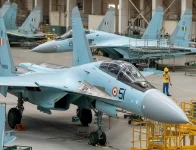
It has been over a year since India's defence industry made a bold move to tap into the African arms market, showcasing its domestically produced military equipment to African nations. However, progress has been slower than anticipated, with several high-profile deals failing to materialize.
The Indian government, under Prime Minister Narendra Modi, has set an ambitious target of $25 billion in defence exports by 2025, with a particular focus on Africa. India's pitch centers on offering affordable alternatives to Western-made weapons, catering to the budget constraints of many African nations.
One notable success was a $1 billion deal with Nigeria to enhance its defence industry, aiming to boost domestic production of military equipment. This agreement has already resulted in the resumption of arms and ammunition production within Nigeria.
However, other deals have faced setbacks. Negotiations for the sale of Tejas fighter jets to Botswana and Egypt have stalled, with technical issues and delays in the Tejas development process cited as contributing factors.
Additionally, Nigeria's recent rejection of the Tejas fighter jets due to concerns about their combat readiness has further highlighted the challenges India faces in convincing potential buyers of the quality and reliability of its indigenous weapons.
Experts point to India's complex bureaucratic processes and delays in research and development as key obstacles to achieving its export ambitions. Prime Minister Modi has pledged to streamline these processes, but significant challenges remain.
Despite these setbacks, India remains optimistic about its prospects in the African arms market. The country's focus on affordability and its growing defence manufacturing capabilities are seen as significant advantages. Recent successes, such as becoming an exporter of sniper rifles, have further bolstered India's confidence.
Whether India can overcome the challenges and achieve its ambitious export goals remains uncertain. The coming years will be crucial in determining whether India can establish itself as a major player in the global arms trade and a significant supplier of military equipment to African nations.

